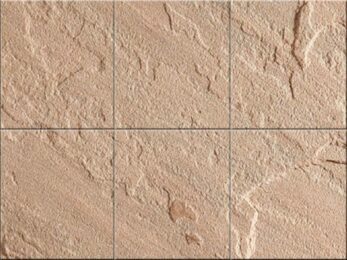Natural stone is a fantastic pick for paving, cladding, and flooring due to its strength, beauty, and endurance. Dholpur stone is gathered in the Dholpur district of Rajasthan, India. It is one natural stone variety that has been popular for its elegance and adaptability for your house or place of business.

Source: Pinterest (Naksh Stone)
Dholpuri tiles: What are they?
Dholpuri tiles are often referred to as Dholpur stone. They are a kind of sandstone derivative valued for their inherent beauty, sturdiness, and weather resistance. They are frequently utilised for pavement, wall cladding, and flooring due to their robustness and tolerance towards high footfall.
Dholpuri tiles have a distinct texture and appearance that can provide personality and charm to any regular setting. They are available in a variety of colours, notably tan, steak pink, red, and brown. They can be polished or left with a natural finish based on the desired aesthetic.
Dholpuri tiles: Applications
Dholpuri tiles are frequently used in flooring, given their durability and slip-resistant qualities. They are suitable for high-traffic areas, including hallways, entryways, and living rooms. Because of their resistance to weathering and moisture, they are also a perfect option for outdoor settings like balconies, pool decks, and paths.
In addition to being utilised for flooring, Dholpuri tiles are also used to cover walls. They can be polished to provide a more modern appearance or left unpolished to achieve a natural and earthy appearance. They are also often used to pave walkways, driveways, and other outdoor spaces.

Source: Pinterest (Sandstone Supplier)
Dholpuri tiles: Advantages
- Durability: Dholpuri tiles are recognised for their toughness and endurance, making them perfect for high-traffic spaces like lobbies, foyers, and living rooms.
- Anti-slip: Dholpur tiles are slip-resistant due to their natural texture, which is ideal for places that are prone to spillage.
- Aesthetic: They can be polished to a high gloss or left with a natural finish, and they are also available in a variety of colours.
- Weather-resistant: Dholpur tiles are a wonderful option for outdoor areas since they can survive weathering and moisture.
Dholpuri tiles: Disadvantages
- Porosity: Dholpuri tiles are porous, which means that if they are not properly sealed and maintained, they may harbour algae and moss due to moisture or get stained, or suffer a variety of damages.
- Cost: When compared to other flooring options like ceramic or vinyl tiles, Dholpuri tiles may be more expensive.
- Maintenance: Dholpuri tiles need to be cleaned frequently and sealed, which may be time-consuming and expensive.
- Chipping: Dholpuri tiles tend to crack or chip if they are subjected to heavy weight or stress, especially near the edges.
Dholpuri tiles: Maintenance
Dholpuri tiles require some care to keep them at their best, just like any natural stone. They can be guarded against stains and damage with regular washing with a neutral floor cleaner and occasional sealing to prevent them from holding moisture. Avoid strong chemicals and acidic cleansers since they might harm the tiles’ surface.
FAQs
What are Dholpuri tiles made of?
Sandstone is a sedimentary rock formed primarily of quartz and feldspar sand-sized grains, and it is the material used to make Dholpuri tiles.
What colours do Dholpur tiles come in?
Dholpur tiles are available in a range of colours, including beige, pink, red, and brown.
Can Dholpuri tiles be used outdoors?
Dholpuri tiles are resistant to weathering; hence, they can be utilised for outdoor applications such as terraces, pool decks, and walkways.
Are Dholpuri tiles slip-resistant?
Dholpuri tiles possess an earthy texture that prevents slipping, which is crucial for places that are frequently exposed to water or spills.
Do Dholpuri tiles require sealing?
Yes, Dholpuri tiles are porous and need to be sealed periodically to prevent stains and structural damage.
How do I clean Dholpuri tiles?
Dholpuri tiles should be cleaned on a regular basis with a neutral cleaner and a moist mop or towel. Avoid using aggressive cleansers or acidic chemicals that could erode the tiles' surface.
| Got any questions or point of view on our article? We would love to hear from you. Write to our Editor-in-Chief Jhumur Ghosh at [email protected] |
Housing News Desk is the news desk of leading online real estate portal, Housing.com. Housing News Desk focuses on a variety of topics such as real estate laws, taxes, current news, property trends, home loans, rentals, décor, green homes, home improvement, etc. The main objective of the news desk, is to cover the real estate sector from the perspective of providing information that is useful to the end-user.
Facebook: https://www.facebook.com/housing.com/
Twitter: https://twitter.com/Housing
Email: [email protected]











